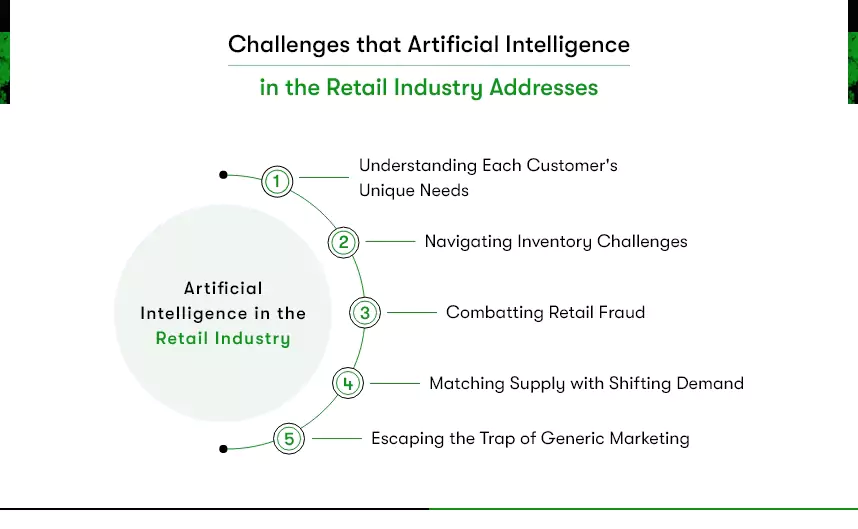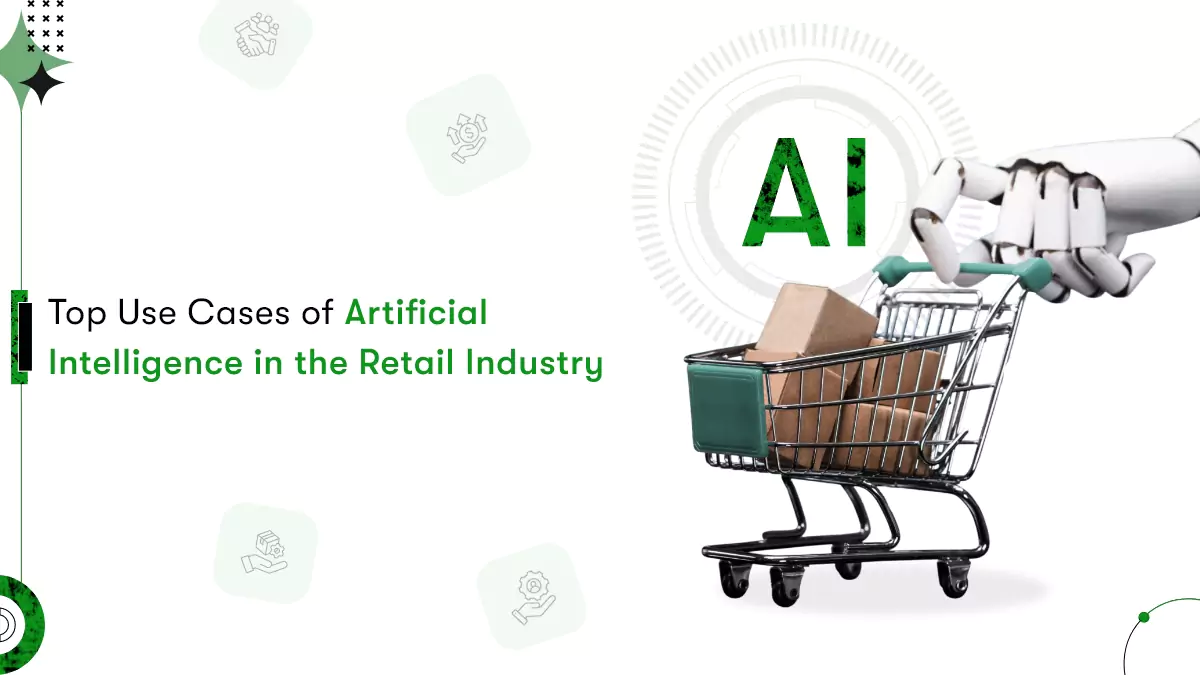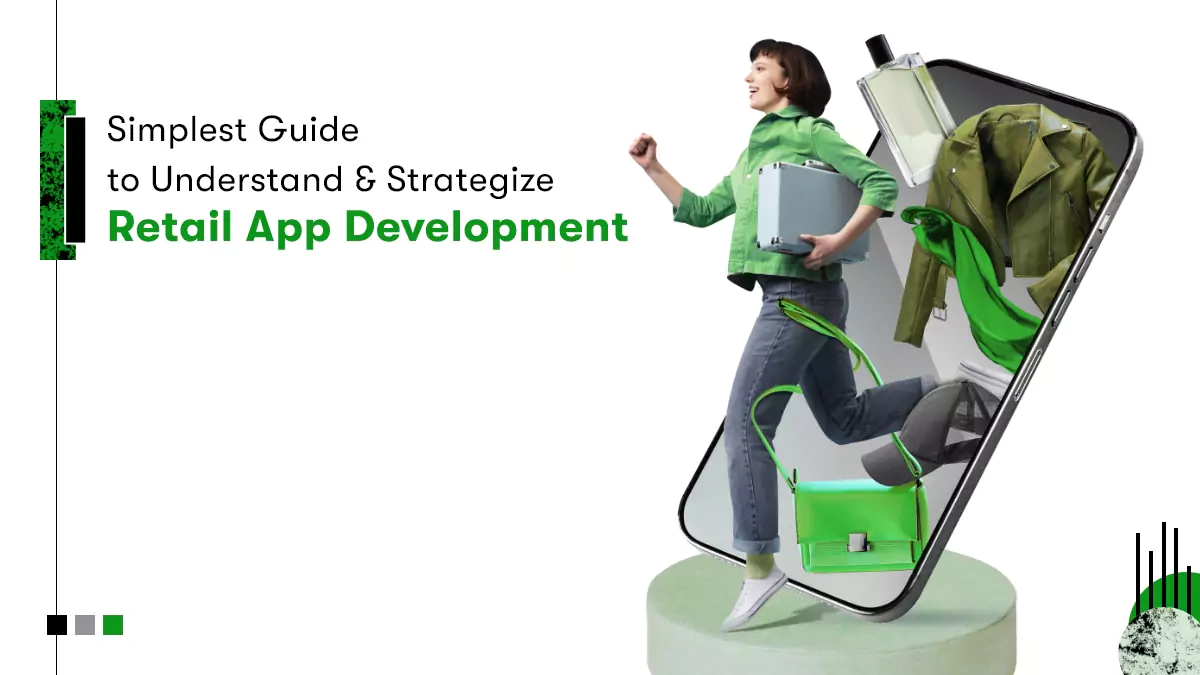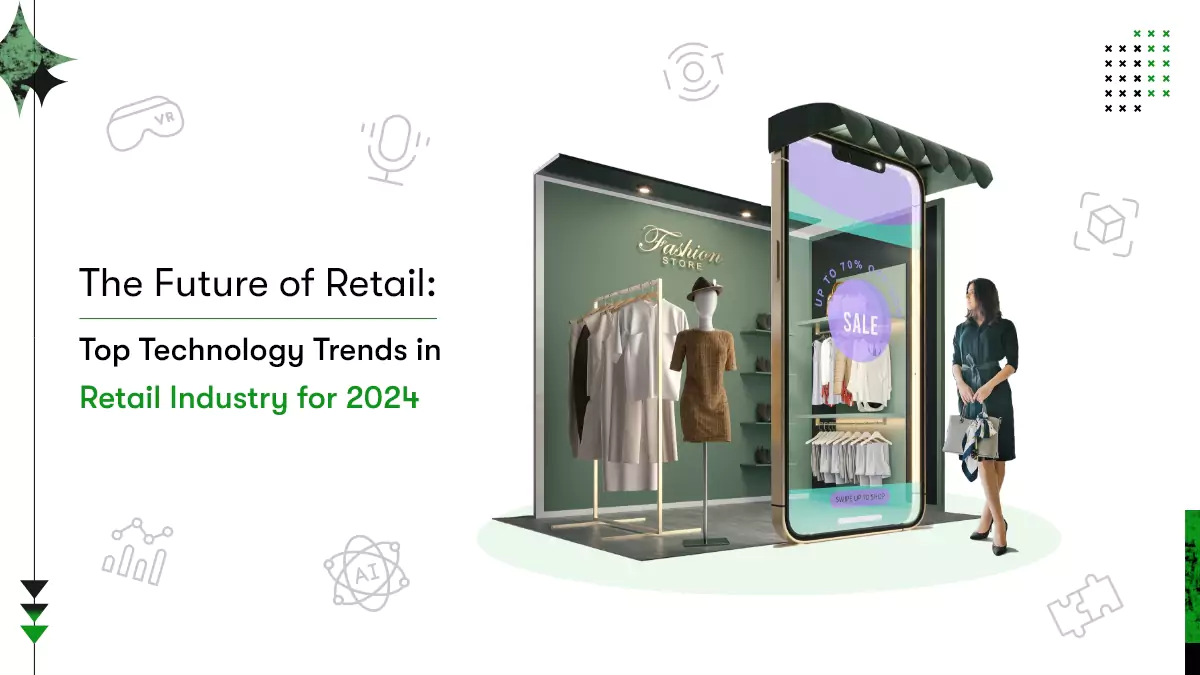What if your inventory could talk to you and tell you exactly what your customers crave? Or using your customer information, you can read their minds to offer exactly what they want, sometimes even before customers know they want it!
That’s the power of Artificial Intelligence in retail. By harnessing AI, retailers can dive deep into their customer behavior. Predicting end-customer desires, you can craft experiences that feel personal and increase customer engagement rate.
For example, a customer browses sneakers on an online store. AI predicts the customer’s interest in eco-friendly options based on their browsing categories. So, it presents personalized suggestions before they express them, enhancing the shopping journey.
The gist of the story is that after the digital transformation in retail, offering personalized shopping experiences has become a necessity. So that customers not only spend time browsing and looking for items but also spend money.
Besides customer analytics, Artificial Intelligence in retail is at the core of customizing every customer’s journey. As per a survey,
About 86% of retailers use AI or automation in some form, while 49% of retailers have already seen cost-saving, 43% have witnessed an increase in revenues, and 44% are witnessing improved productivity.
How would you blend this powerful AI technology with your unique brand essence? Because it’s about striking that perfect balance between high-tech and high-touch. The question is, are you ready to not just join the AI revolution but lead it, transforming the shopping experience into something extraordinary?
If so, then let’s dive into the exploration of potential AI solutions for retail.
How is AI changing the Retail Industry?
If combined with other technology trends in retail, including Machine Learning, Data Analytics, and Natural Language Processing, Artificial Intelligence opens the gate to
- Gaining deeper customer insights,
- Enhancing brand interaction,
- Automating and Improving Decision-making,
- Forecasting demand and streamlining the supply chain,
- Optimizing logistics and cost-saving,
- Strengthening security and Fraud prevention
Overall, the impact of AI on the retail industry is massive. Coming straight from the fictional world to reality, AI empowers retailers to meet customer demands, drive operational efficiency, and lead the market with innovation.
Furthermore, AI solutions for retail also assist in addressing challenges all sizes of retail businesses encounter. For example,
Challenges that Artificial Intelligence in the Retail Industry addresses

Meeting Individual Customer Expectations
One-size-fits-all approaches are ages old now. Customers want their solutions tailored to their preferences and history. And failing to enlighten customers with personalized solutions leads to lower engagement and lost sales opportunities.
However, AI algorithms excel at analyzing customer data, including past purchases, browsing history, and preferences. AI simplifies offering highly personalized recommendations and experiences for each customer.
Problems of Overstocking and Understocking
Balancing inventory levels is a complex task for retailers, leading to overstocking and understocking struggles because inventory management is influenced by varying demand, seasonality, and market trends.
Leveraging AI and predictive analytics, you can overcome this challenge as this duo allows you to forecast demand accurately. So with AI, you can maintain optimal inventory levels. Furthermore, by analyzing sales data, market trends, and even external factors like weather, you get precise insights into what products are likely to be in demand.
Safeguarding Against Fraud Threats
Detecting and preventing fraud manually is extremely time-consuming and often ineffective due to human intervention, leading to significant financial losses and damage to customer trust.
Harnessing AI to detect anomalies and transaction patterns that may indicate fraudulent activity is a proactive approach. According to Statista, about 24% of retailers use Artificial Intelligence to overcome fraud hurdles and enhance security and customer trust.
Aligning Supply With Fluctuating Market Demands
Stockouts can sometimes lead to losing customers to competitors. But how can retailers know when to stock what to avoid customer frustration or excessive inventory that ties up capital?
The answer is Artificial Intelligence! AI makes it easy to read between the lines of sales data, consumer trends, and other relevant factors. Consequently, you can make data-backed decisions about stocking and distribution, preventing overstocking.
Generic Marketing
Traditional marketing approaches often miss the mark in targeting the right customers with relevant messages. Thereby, marketing spend is wasted on poor customer engagement. Since AI analyzes customer data to understand preferences and behaviors, you can create targeted marketing campaigns leveraging the same insights.
For instance, AI can segment customers based on their likelihood to purchase certain products and tailor marketing messages accordingly, increasing campaign effectiveness and ROI.
Now, you may ask how to put AI into use across your retail business to overcome common and unexpected challenges as well as raise your bottom line.
Top 9 AI Use Cases in Retail Businesses
From personalized customer interactions to efficient inventory management, AI is unlocking new potentials and solving complex challenges that have long plagued the retail sector. In today’s highly competitive landscape, staying ahead means not only embracing change but leading it. Let us see how AI use cases in retail transform the industry.

1. Increase Customer Interactions
AI-driven tools like chatbots and virtual assistants engage customers through personalized communication. Answering queries, providing product recommendations, and guiding customers through the purchasing process, these AI tools can enhance the overall shopping experience.
Approximately 59% of retailers use AI technologies to enhance customer experience, demonstrating its effectiveness in improving engagement and customer satisfaction.
2. Control Inventory Efficiently
AI uses predictive analytics to forecast demand, thus helping retailers to maintain optimal inventory levels. It analyzes sales data, market trends, and customer behavior to predict what products will be in demand. And when you can predict the market, you can easily avoid conditions of overstocking or stockouts.
3. Maximize Profit Margins
Using AI algorithms, you can dynamically adjust prices based on demand, competition, and market conditions. When you price your product effectively through strategies like dynamic pricing and real-time promotions, you can easily optimize profit margins, enhancing revenue.
Furthermore, AI contributes to revenue growth through techniques like cross-selling and upselling. It’s proven by a case study showed a 10% increase in revenue due to AI-generated product recommendations.
4. Automate Customer Support with Chatbots
Around 49% of retail business leaders plan to invest in AI to enhance customer service with chatbots. Do you know why?
AI-powered chatbots provide instant, 24/7 customer support. With such Chatbots, you can handle routine inquiries, freeing up staff for more complex issues, thus improving response times and customer satisfaction.
5. Optimize Supply Chain Operations
Using Artificial Intelligence, retailers can eliminate the hassle of the supply chain, from demand planning to distribution. Leveraging the prediction power of AI in the supply chain, you can streamline logistics and reduce operational costs.
6. Discover Innovative Products
You can also use Artificial Intelligence in product discovery. It helps in analyzing customer trends and market data so that you can understand customer preferences. Consequently, you can identify the market gaps and develop new products that customers really want.
7. Sales Forecasting
Analyzing past sales data through Excel sheets is so ancient. Today, you can use predictive modeling to analyze past sales data and market trends effortlessly and even forecast future sales. Thereby, you can make data-driven decisions about stock levels and marketing strategies.
8. Sentiment Analysis
Another gem feature of Artificial Intelligence is that it allows you to leverage sentiment analysis. Now, leveraging this AI capability in your retail business, you can gauge public opinion about your products and brands. You can also exploit sentiment analysis to understand your customers through their feedback and social media mentions, enhancing your market strategies.
9. Predictive Maintenance
What good of using AI if you don’t take advantage of it to foresee potential breakdowns to minimize maintenance effort? Since retail environments are usually equipped with machinery or electronic systems, you can easily deploy AI and predict maintenance needs. Basically, through predictive analytics, you can reduce downtime as well as maintenance costs.

AI in Retail: Key Models and Algorithms Driving Industry Innovation
| AI Model/Algorithm | Application in Retail | Description/Example |
| Recommendation Systems | Product and service suggestions | Collaborative Filtering: User-item filtering, matrix factorization Content-Based Filtering: User profiles and item attributes Hybrid Models: Combination of collaborative and content-based filtering |
| Natural Language Processing (NLP) | Analyzing customer feedback and social media | Sentiment Analysis: Models like BERT, GPT-3, VADER used for analyzing customer reviews and feedback |
| Computer Vision | Product image recognition, visual search, inventory management, and security | Image Recognition: Product recognition and visual search Object Detection: Tracking products, Preventing theft, and Monitoring shelves. Facial Recognition: Used for security and personalized experiences |
| Dynamic Pricing Algorithms | Real-time price adjustment | Adjusting prices based on demand, competitor pricing, and historical data |
| Inventory Management | Optimizing inventory levels | Demand Forecasting and Supply Chain Optimization |
| Fraud Detection | Identifying fraudulent transactions and activities | Machine Learning, Anomaly Detection, and deep learning models identify fraudulent activities. |
| Customer Segmentation | Grouping customers for targeted marketing | Segmenting customers based on shared behaviors and attributes, and Categorizing them based on recency, frequency, and monetary value |
| Chatbots and Virtual Assistants | Assisting customers in making purchase decisions, providing product information, and processing orders | Conversational AI: Using NLP models and chatbot platforms to help customers in processing orders. |
Prominent Brands Setting Examples of AI in Retail Businesses
To help you understand the concept of AI in the retail industry better, let’s look at how some renowned brands are leveraging AI. Spoiler alert, you already know these brands, setting perfect examples of using Artificial Intelligence in retail to its fullest.

Amazon Product Recommendations & Alexa
Amazon uses AI extensively to enhance its customer experience and operational efficiency. One of its most notable uses is in its product recommendation system. Amazon employs an “item-based collaborative filtering” algorithm, which personalizes the homepage of each customer based on their interests and past purchasing history.
This algorithm uses the purchase histories of other customers who bought the same product, factoring in customer feedback and ratings to provide tailored recommendations. Additionally, Amazon’s voice assistant Alexa and their Amazon Go physical stores leverage AI to offer a seamless shopping experience by collecting various data points, such as music preferences or purchase history, to provide holistic suggestions.
Amazon’s AI-driven approach is a major contributor to their success, with their recommendation engine accounting for 35% of their total revenue.
Sephora Virtual Try-On & Skincare Advice
Sephora is another example of a retail brand utilizing AI to enhance customer experience. Though specific details were not found in the search, Sephora is known for its virtual try-on and skincare advice features, which typically use AI-driven technologies like augmented reality (AR) and machine learning.
These features allow customers to virtually try on makeup products or receive personalized skincare recommendations, enhancing the shopping experience and aiding in more informed purchasing decisions.
Walmart Demand Forecasting & Supply Chain Optimization
Walmart employs AI for demand forecasting and supply chain optimization. This involves using AI algorithms to predict future demand and align it with supply, thus ensuring optimal inventory levels and efficient logistics. Such AI applications help minimize stockouts or excess inventory, leading to cost savings and improved customer satisfaction.
Although specific statistics were not found in the search, it’s well-known that Walmart has been investing in AI to maintain its competitive edge in the retail market.
What is Flutter, and How does it simplify the use of AI in Retail?
You might be wondering why Flutter is mentioned here while we are discussing the use of AI in retail. Imagine creating an app that not only looks sleek and runs smoothly across various platforms but also seamlessly integrates AI capabilities. That’s the magic Flutter brings to the table.
Flutter is an open-source UI software development kit created by Google. Known for its ability to build natively compiled applications for mobile, web, and desktop from a single codebase, Flutter is revolutionizing the way retail apps are developed.
Flutter simplifies the complex process of app development, allowing you to focus more on implementing AI features that enhance customer experiences, including personalized recommendations or efficient inventory management.
The compatibility with Firebase is another specialty of Flutter, further sweetening the deal. Firebase offers functionalities like real-time databases, cloud storage, and user authentication, which are essential for AI-driven retail app development.
Flutter shines in the retail AI arena for several compelling reasons:
- Multi-Platform Efficiency: Develop natively compiled applications across various platforms from a single codebase.
- AI Integration: Simplifies embedding of AI features in retail apps, focusing on enhancing user experience and operational efficiency.
- Firebase Compatibility: Offers functionalities like real-time databases and cloud storage essential for AI-driven apps.
- Hot Reload Feature: Allows immediate visibility of code changes, significantly saving development time.
So now, if you want to reap the benefits of both worlds, Flutter and AI, hire Flutter app developers with retail industry expertise.
Kody Technolab Limited’s role in helping you use AI in retail!
AI is revolutionizing the retail industry, offering dynamic solutions from personalized customer interactions and inventory management to sophisticated demand forecasting and chatbot services. Flutter further enhances this transformation, providing a versatile platform for the seamless integration of AI in retail applications.
At Kody Technolab Limited, we specialize in leveraging AI in retail and harnessing Flutter’s potential to create innovative, user-friendly retail applications. Our expertise lies in transforming retail challenges into opportunities for growth and customer satisfaction.
So, in case you are looking for Flutter app development services tailored to your retail business, feel free to connect with our experts.










 Contact Information
Contact Information